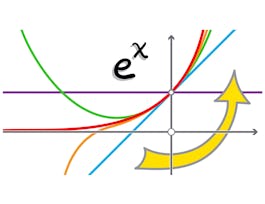Calculus is one of the grandest achievements of human thought, explaining everything from planetary orbits to the optimal size of a city to the periodicity of a heartbeat. This brisk course covers the core ideas of single-variable Calculus with emphases on conceptual understanding and applications. The course is ideal for students beginning in the engineering, physical, and social sciences. Distinguishing features of the course include: 1) the introduction and use of Taylor series and approximations from the beginning; 2) a novel synthesis of discrete and continuous forms of Calculus; 3) an emphasis on the conceptual over the computational; and 4) a clear, dynamic, unified approach.



(271 reviews)
Details to know
32 assignments
See how employees at top companies are mastering in-demand skills

There are 5 modules in this course
Having seen some calculus before, you may recall some of the motivations for integrals arising from area computations. We will review those classical applications, while introducing the core idea of this module -- a differential element. By computing area and volume elements, we will see how to tackle tough geometry problems in a principled manner.
What's included
6 videos2 readings9 assignments
There's more to geometry than just area and volume! In this module, we will take things "to the next level", ascending to higher dimensions. Coming back to the 3-d world, we will return to problems of length and area, but this time in the context of curves and surfaces. As always, the emphasis will be on how to construct the appropriate differential element for integrating.
What's included
4 videos6 assignments
There is so much more to applications of integrals than geometry! So many subjects, from physics to finance, have, at heart, the need for setting up and computing definite integrals. In this short but intense module, we will cover applications including work, force, torque, mass, and present & future value.
What's included
3 videos4 assignments
There is a statistical aspect to integrals that has not yet been brought up in this course: integrals are ideal for computing averages. Motivated by physical problems of mass, centroid, and moments of inertia, we will cover applications of integrals to averages.
What's included
5 videos6 assignments
This capstone module gives a very brief introduction to probability, using what we know about integrals and differential elements. Beginning with common-sense uniform probabilities, we move on to define probability density functions and the corresponding probability element. Building on the physical intuition obtained from centers of mass and moments of inertia, we offer a unique perspective on expectation, variance, and standard deviation.
What's included
3 videos1 reading7 assignments
Instructor

Offered by
Recommended if you're interested in Math and Logic

University of Pennsylvania

Johns Hopkins University

The University of Sydney

Duke University
Why people choose Coursera for their career




Learner reviews
Showing 3 of 271
271 reviews
- 5 stars
90.77%
- 4 stars
7.38%
- 3 stars
1.10%
- 2 stars
0.36%
- 1 star
0.36%

Open new doors with Coursera Plus
Unlimited access to 7,000+ world-class courses, hands-on projects, and job-ready certificate programs - all included in your subscription
Advance your career with an online degree
Earn a degree from world-class universities - 100% online
Join over 3,400 global companies that choose Coursera for Business
Upskill your employees to excel in the digital economy
Frequently asked questions
Access to lectures and assignments depends on your type of enrollment. If you take a course in audit mode, you will be able to see most course materials for free. To access graded assignments and to earn a Certificate, you will need to purchase the Certificate experience, during or after your audit. If you don't see the audit option:
The course may not offer an audit option. You can try a Free Trial instead, or apply for Financial Aid.
The course may offer 'Full Course, No Certificate' instead. This option lets you see all course materials, submit required assessments, and get a final grade. This also means that you will not be able to purchase a Certificate experience.

